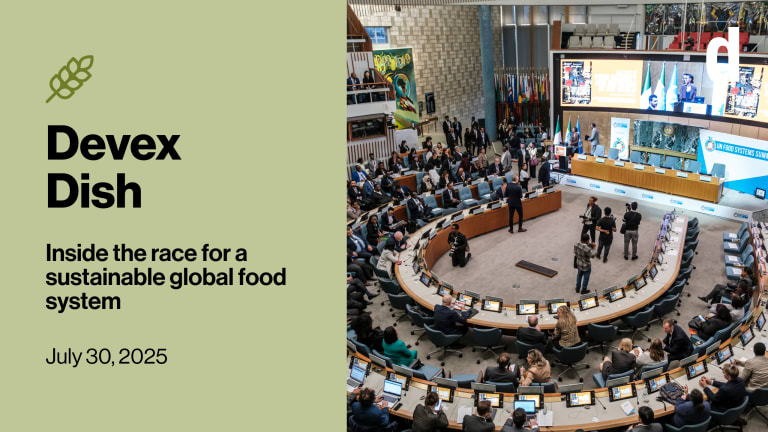
LONDON — The world is still “at the beginning” of the COVID-19 pandemic and is “not even at the middle,” Dr. David Nabarro told an influential group of British politicians Tuesday.
Nabarro, a World Health Organization special envoy on COVID-19 and former candidate to lead the organization, spoke in candid terms to the U.K. Parliament’s Foreign Affairs Committee.
As well as launching a robust defense of WHO’s conduct at the start of the COVID-19 outbreak, he stressed the pandemic’s potential to undo development gains made in recent years and urged the United Kingdom’s Foreign, Commonwealth & Development Office to help low-income countries deal with the pandemic.
“Foreign ministries ... must take a global perspective because there is a real likelihood that this is going to massively increase poverty.”
— Dr. David Nabarro, special envoy on COVID-19, World Health Organization“We’re beginning to see what damage it's going to cause to the world, and it's getting nastier. … It’s a terrible situation,” Nabarro told the members of Parliament.
“A health issue has got so out of control it’s [causing] ... huge economic contractions which will probably double the number of poor people, double the number of malnourished, lead to hundreds of small businesses going bankrupt, and generally wreck the destination for a lot of young people who are not going to get education or opportunity,” he said.
The pandemic has caused a severe schooling crisis, with millions of children expected to never return to the classroom, as well as massive unemployment.
Nabarro added that: “Poor countries are facing particularly serious problems right now. Not only are they having to cope with the disease and trying to work out what impact the disease is having … but they’ve also got to cope with the impact of containment measures on their people: vast increases in poverty, hunger, unemployment, and so on.”
Helping low-income countries deal with the fallout of the pandemic should therefore be a priority for the new FCDO, Nabarro said.
“My own view is that ... particularly the rich nations should be looking very hard at what’s happening in poor nations and thinking through what do they need in terms of cash, political support, and platforms through which they can work together to deal with the nonhealth aspects of this crisis,” he said.
“Foreign ministries, and in [the] case of the U.K., the Foreign, Commonwealth & Development Office … really need to be working hard not just on what’s happening inside their own borders or in their own immediate regions, but they must take a global perspective because there is a real likelihood that this is going to massively increase poverty and undo some of the gains that the U.K. and others have worked so hard to support in recent decades.”
Battered with criticism, what's next for WHO?
COVID-19 is WHO's biggest emergency, but politics is its biggest headache. We ask experts what the world really wants from WHO.
Nabarro was giving evidence as part of a Foreign Affairs Committee inquiry on the country’s role in strengthening multilateral organizations, including the issue of whether WHO needs reform and whether its powers should be strengthened to include sanctions and compulsory inspections. Ilona Kickbusch, an independent consultant on global health who has worked with WHO, also spoke to members of Parliament.
Asked by committee member Alicia Kearns whether WHO should be “more willing to criticize public health failings that have an impact on the world’s health … because they actively misled or withheld information,” Kickbusch reminded politicians that the “people who agree on the rules and the international health regulation are the member states themselves.”
“They [states] have actively and consciously … made sure that certain powers were not given to the WHO,” she said. “I think this is really a call for countries who want this kind of strengthening of the secretariat, even if it’s appointing an independent committee that would do that kind of thing.”
Both speakers criticized a lack of funding for WHO. “The current financing basis of the organization is unsustainable, given what it is being asked to do and given the extent to which the world depends on it,” Nabarro said.









